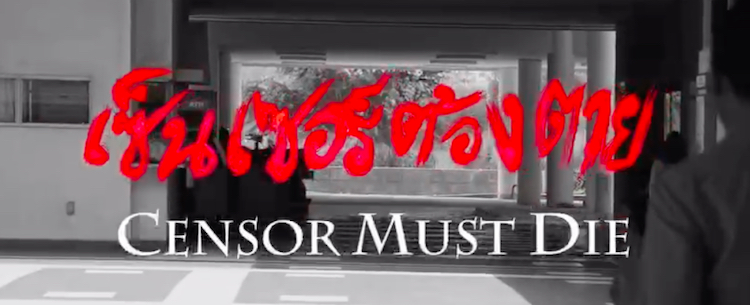
It’s fair to say that director Ing K. has had her battles with the film censors. In an interview for Thai Cinema Uncensored, she described the state censorship board as “a bunch of trembling morons with the power of life and death over our films.” Two of her films were banned in Thailand—My Teacher Eats Biscuits (คนกราบหมา) in 1998, and Shakespeare Must Die (เชคสเปียร์ต้องตาย) in 2012—though both bans have recently been lifted.
Ing’s documentary Censor Must Die (เซ็นเซอร์ต้องตาย) shows producer Manit Sriwanichpoom receiving the censor’s initial verdict on Shakespeare Must Die, and follows him as he appeals against the ban at the Ministry of Culture and files a case with the Office of the National Human Rights Commission. (The documentary was made in 2013, though it was another decade before the ban was finally revoked, following a judgement by the Supreme Court.)
Censor Must Die’s most revealing scene takes place at the headquarters of the Ministry of Culture: in the lobby, a TV plays a video demonstrating the traditional Thai method of sitting in a polite and respectful manner. The video encapsulates the Ministry’s didactic and outdated interpretation of Thai culture, and it was parodied by the mock instructional video “How to Behave Elegantly Like a Thai” in Sorayos Prapapan’s film Arnold Is a Model Student (อานนเป็นนักเรียนตัวอย่าง).
The documentary premiered at the Freedom on Film (สิทธิหนังไทย) seminar in 2013, was shown a few months later at the Thai Film Archive, and had private screenings at Silpakorn University and the Friese-Greene Club. This week, Censor Must Die returns to Cinema Oasis, the cinema Ing and Manit founded in Bangkok, screening on 25th–28th July; and 1st–4th, 8th–11th, and 15th–18th August. It was most recently shown there in May.
Ing’s documentary Censor Must Die (เซ็นเซอร์ต้องตาย) shows producer Manit Sriwanichpoom receiving the censor’s initial verdict on Shakespeare Must Die, and follows him as he appeals against the ban at the Ministry of Culture and files a case with the Office of the National Human Rights Commission. (The documentary was made in 2013, though it was another decade before the ban was finally revoked, following a judgement by the Supreme Court.)
Censor Must Die’s most revealing scene takes place at the headquarters of the Ministry of Culture: in the lobby, a TV plays a video demonstrating the traditional Thai method of sitting in a polite and respectful manner. The video encapsulates the Ministry’s didactic and outdated interpretation of Thai culture, and it was parodied by the mock instructional video “How to Behave Elegantly Like a Thai” in Sorayos Prapapan’s film Arnold Is a Model Student (อานนเป็นนักเรียนตัวอย่าง).
The documentary premiered at the Freedom on Film (สิทธิหนังไทย) seminar in 2013, was shown a few months later at the Thai Film Archive, and had private screenings at Silpakorn University and the Friese-Greene Club. This week, Censor Must Die returns to Cinema Oasis, the cinema Ing and Manit founded in Bangkok, screening on 25th–28th July; and 1st–4th, 8th–11th, and 15th–18th August. It was most recently shown there in May.
